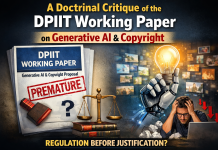This is a two parts post. The first part discusses the judgment of the Bombay High Court and the second part analyses the policy implications of Copyright Registration and proposes certain recommendations in this regard.
Copyright Registration: A Convolutional Need?
Question: “Is it necessary to register a work to claim copyright?”
Answer: No. Acquisition of copyright is automatic and it does not require any formality. Copyright comes into existence as soon as a work is created and no formality is required to be completed for acquiring copyright. However, the certificate of registration of copyright and the entries made therein serve as prima facie evidence in a court of law with reference to a dispute relating to ownership of copyright.
It is one of the FAQs of the Copyright Registry. But wasn’t it an obvious question that we have heard multiple times? This is also clear from Section 13 that requires work to be original in order to claim copyright. Similarly, many High Courts have also clarified this stand in numerous judgments such as A. Sundarasan v. A.C. Thirulokchandar and Ors (Madras High Court); Satsang and Anr. vs. Kiron Chandra Mukhopadhyay and Ors (Calcutta High Court); Kumari Kanaka vs. Sundararajan (Kerala High Court), Manojah Cine Productions v. A. Sundaresan and Anr (Madras High Court); Deepak Printery v. The Forward Stationery Mart and Ors. (Gujarat High Court); Radha Kishna Sinha and Anr. vs. The State of Bihar and Anr. (Patna High Court); Nav Sahitya Prakash and Ors. v. Anand Kumar and Ors (Allahabad High Court); Glaxo Orthopedic U.K. Ltd. v. Samrat Pharma (Delhi High Court); R. Madhavan vs. S.K. Nayar (Kerala High Court); K. Marari v. Muppala Ranganayakamma (Andhra Pradesh High Court); K.C. Bokadia and Anr. vs. Dinesh Chandra Dubey (Andhra Pradesh High Court); Zahir Ahmed v. Azam Khan (Calcutta High Court); Burroughs Wellcome (India) Ltd. v. Uni-Sole Pvt. Ltd. and Ors (Bombay High Court); Rajesh Masrani Vs. Tahiliani Design Pvt. Ltd (Delhi High Court).
But wait! it’s not ALL. Nor was the above FAQ an obvious question. There are judgments like Gulfam Exporters and Ors. V. Sayed Hamid and Ors (Bombay High Court), Dhiraj Dewani v. Sonal Infosystems (Bombay High Court) and Brundaban Sahu v. B. Rajendra Subudhi (Orissa High Court), Mishra Bandhu Karyalaya and Ors. v. Shivratanlal Koshalwhich (M.P. High Court) which have held registration of copyright as a mandatory requirement.
Fortunately (or unfortunately whichever way you see it), in Sanjay Soya v. Narayani Trading, the Bombay High Court, held that registration of copyright is not mandatory, and regarded Dhiraj Dewani v. Sonal Infosystems as per incuriam. More importantly, besides copyright registration, the case also unfolded the legislative history behind such an arrangement, the international legal framework on this issue, and went on to categorically demur the reasoning of the Dhiraj Dewani case. However, I must note that some aspects of the judgment as discussed below, are (or at least appear to be) problematic and call for critical scrutiny otherwise they may attract a panoply of problematic policy implications in the future.
(Note: Read Deepak Gogia’s detailed article here which was published before the judgment but coincidently underscores similar points as raised in the Sanjay Soya Case)
The Case in Hand
The present dispute is concerned with the registered label mark which is also an artistic work under Section 2(c) enjoying copyright protection. Both the parties [Sanjay Soya (Plaintiff) and Narayani Trading (Defendant)] are in the business of selling soyabean oil. Plaintiff, the owner of the artistic work and the label started using the label before the defendant without getting it registered under the Copyright Act, 1957. Defendant started using a similar label with similar design color and fonts which the Plaintiff claimed to be an infringement of its trademark (in the label mark) and copyright (in artistic work).
The defendant questioned the non-registration of copyright and challanged the validity of assignment between the Plaintiff and the artist (who created the label in the first place). However, holding the registration to be voluntary, the Court demurred the assignment argument by saying that the defendant is an ‘outsider (sic)’ to the agreement and cannot impeach the contract between the plaintiff (owner of the artistic work) and the original author of it. Further, the defendant argued that the plaintiff a commercial entity cannot be the artist under Section 2(d) and cannot own the work, but the Court again flattened this by underscoring Section 17(1),(2), and (3) which allow enable an employer to be the owner of the work. Defendant also contended that the plaintiff cannot own trademark and copyright at the same time, which the Court brushed aside by highlighting that both are distinct and disjunctive and this is common for commercial art and commercial graphic design.
Categorical Consideration of Dhiraj Dewani Case
Dhiraj Diwani case deals with infringement of taxation software. In this case, the plea for civil and criminal remedies brought under Sections 63, 63B, and 64 require the knowledge of the infringer to commit infringement. Noting the strict interpretation of penal statutes, the Court focused on the knowledge aspect of the accused and held the copyright registration to be mandatory. Conversely, in the present case, Justice Patel demolished these reasonings and noted that it was rendered in ignorance of the pre-decided cases of the same court, hence, it is per incuriam. The Court said that the Single Judge in the Dhiraj Diwani Case was bound to follow these cases, and if not agreed, then refer the case to the Hon’ble Chief Justice to constitute a larger bench to decide the question of law. However, it was not done by it. Therefore, it is not a precedent to be relied upon. The Court went on and categorically explained why the reasoning of the Dhiraj Diwani Case is patently problematic.
Firstly, the Court said that equating registration under copyright and trademark law is inaccurate because two are entirely distinct. Registration under the Trade Marks Act grants specific rights (right to sue for infringement) which are not available to an unregistered proprietor. Conversely, there is no such requirement under the Copyright Act which gives a bundle of rights to the first owner of copyright without requiring prior registration. Section 51 of the Copyright Act does not give specific regard to registered copyrighted work whereas Section 27 of the Trademark Act specifically focuses on the registered trademarks. The Court also discussed the nature of both copyright and trademark and noted that both laws work in different spheres but may overlap as happened in the present case. An artistic work may receive both trademark registration as a label and copyright protection as an artistic work. The former requires registration to sustain a suit for infringement whereas the latter requires originality.
Secondly, deliberating on the knowledge aspect raised in the Diwani Case that an infringer does not have the knowledge of the work sans registration, the Court held it to conceptually and logically wrong and said that every forger, plagiarist or, ‘rip-off artist’ knows that he or she is forging, plagiarising or ripping off another’s original work.
Thirdly, the Court highlighted Section 51 and noted that it does not require a work to be registered nor does it arise a need to be read with Section 45(1) which states that the owner of the copyright may apply for registration. Moreover, copyright, which solely depends upon the originality of the work, cannot be claimed and owned by two persons at the same time (note: fair use doctrine also does not dilute such authorship but rather allows others to use work for certain purposes – ownership remains intact.). However, in the trademark law that accepts the principles like acquiescence and honest concurrent use, there is always a possibility of join proprietors or two owners of very similar marks. Hence, both are different laws that can’t be equated for registration basis.
Fourthly, the Court highlighted the Berne Convention of 1886 of which India is a member. It has three fundamental principles namely 1.) National Treatment 2.) Automatic protection i.e. Protection must not be conditional upon compliance with any formality, and 3.) Independence of Protection. Relevantly, the second principle clarifies that copyright protection (in India) cannot be subject to a formal requirement like registration in this case.
Fifthly, addressing the question of the relationship between the jurisdiction and registration, the Court controverted the reasoning of a ‘special court’ under Section 62 under Copyright Act, 1957 and 134 of Trademark Act, 1999 and held this to be an additional right of the proprietor or owner of the copyright to seek remedies. Interestingly, Section 62 under Copyright Act, 1957 and 134 of Trademark Act, 1999 enable a registered proprietor/copyright owner to sue a defendant where the plaintiff proprietor/copyright owner is situated. This is an additional jurisdictional facility that is supplemental to the ordinary provisions of the jurisdictions of the civil court under CPC. Hence, the Court held that for a copyright infringement, recourse to the special court (i.e. the court where the registered owner of copyright resides) is unavailable without registration, has no foundation in the statute itself. It was also justified by underscoring the nature of copyright as a right in rem that can be invoked against the world, which further clarifies that the right to sue for infringement is not dependent upon the registration of copyright.
For these reasons, the Court held that copyright registration is not mandatory.
Conclusion (Not really-read the second Part)
The present case is well reasoned and argued but if we peruse it cautiously, it does make some assumptions and arguments which in my opinion cannot be accepted at one go. For e.g. Para 50 the Court note “That Court (in Dhiraj Dewani) believed that the author of a work — literary or artistic — might be cast into a state of wonderment on completing his or her work as to whether or not his or her work was indeed original or was an infringement of someone else’s copyright; and hence that Court said that copyright registration was necessary. But this is conceptually and logically plainly wrong. No forger or plagiarist is ever in any such state of wonderment. Every forger, plagiarist or, to use a more colloquial expression, ‘rip-off artist’ knows what he or she is about, i.e., forging, plagiarising, or ripping off’ another’s original work, even as he or she goes about doing it said.
Such absolute assertiveness of infringer’s/accused knowledge by the Court is problematic at multiple levels and needs to be examined. For an issue like copyright registration which is prima facie evidence of the ownership of a work, there are both pros are cons of it. Adyasha Samal from SpicyIP has made an interesting attempt to highlight such policy implications of this judgment here.
In the next part of the post, I shall also be delving into the policy aspect of copyright registration and propose certain amendments/suggestions in this regard. See you there.
Image source: here












